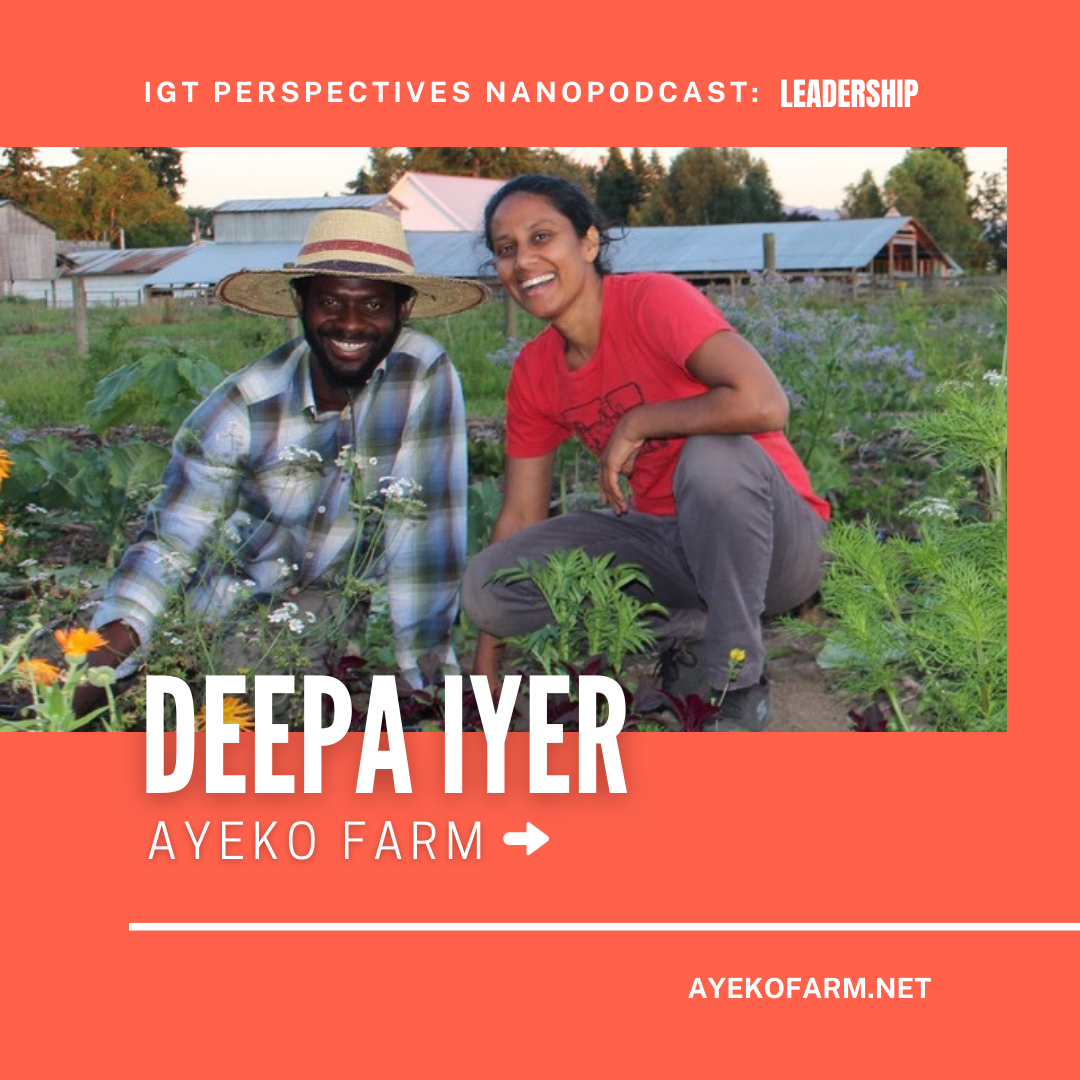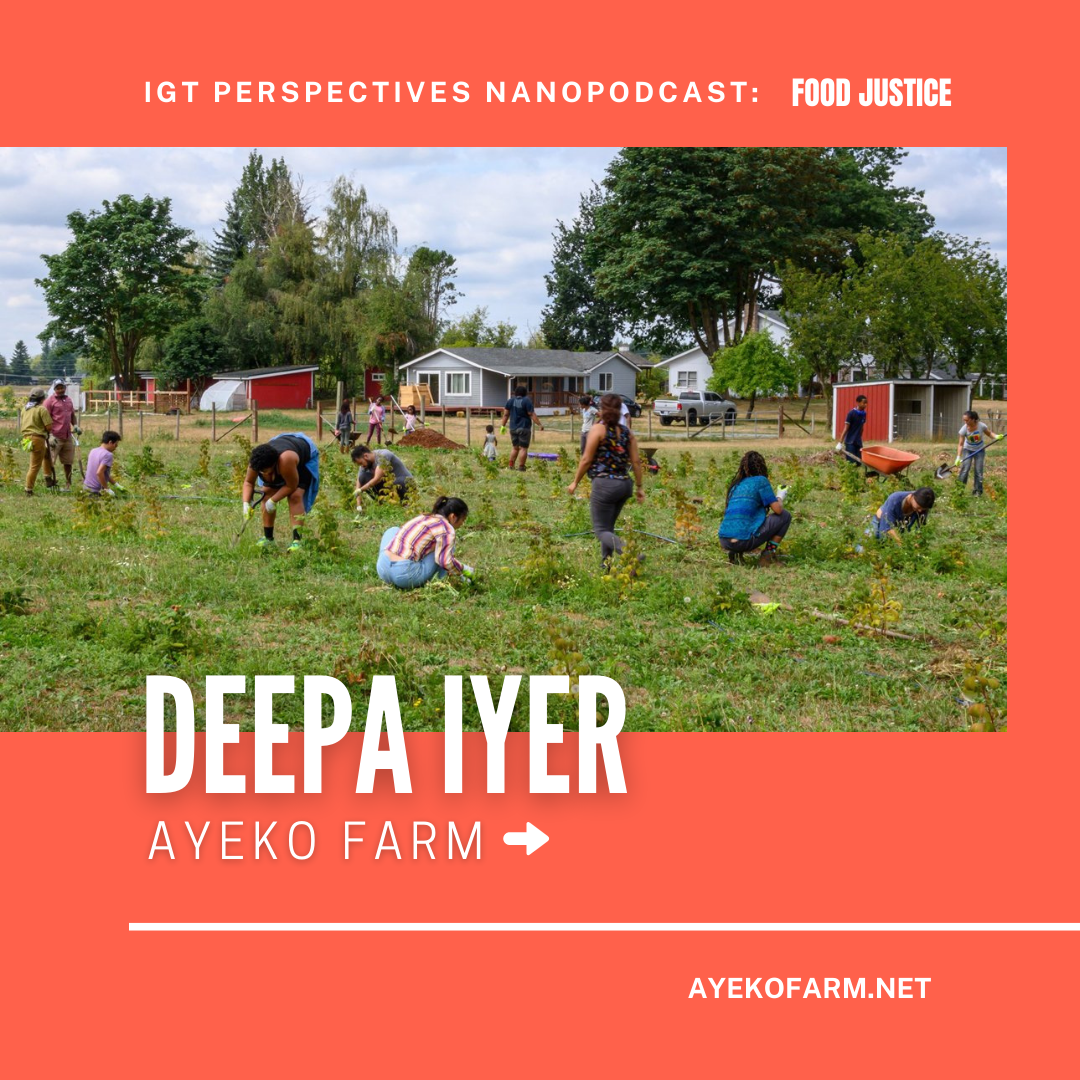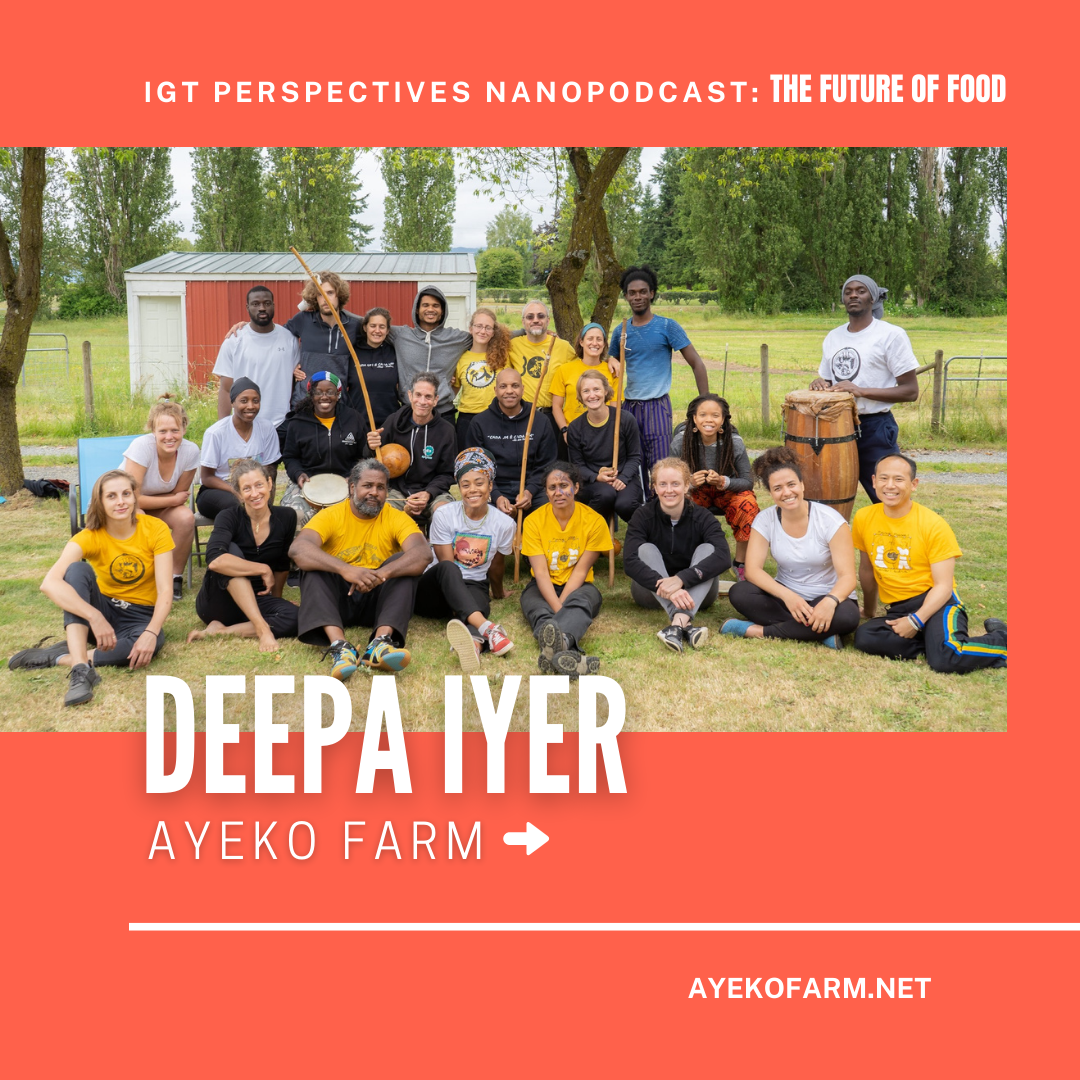The world is full of changemakers. And you might be one too.
Meet Deepa Iyer, founder and food justice leader of Ayeko Farm in Enumclaw, Washington. She’s building a space for Black, Indigenous, and people of color communities to reconnect to the land and culture through food and farming.
Ayeko Farm is a 21-acre farm on the Newaukum Creek. Deepa and her fellow farmers are working to build a native plant buffer along the creek and do their part to restore salmon to the area. They are striving to learn more about the practices of the original caretaker communities of the land. They acknowledge that Ayeko farm is on land cared for by the Coast Salish, the Duwamish, and the Puyallup peoples.
Listen in as Deepa shares her perspective on taking up space as a leader, providing land access and shifting power to BIPOC communities, and building a future that’s inclusive for all.
Subscribe to Perspectives on Apple Podcasts or Spotify for more inspo from food leaders.

Alyssa Martinez Neumannn (00:03):
The world is filled with changemakers, and you might be one too.
Maura Paxton (00:06):
Welcome to the nanopodcast, where we serve up bite-sized pieces of inspo from food leaders. We’re your hosts, Maura Paxton.
Alyssa Martinez Neumannn (00:14):
And Alyssa Martinez Neumannn. You’re listening to Perspectives.
Today we talk with Deepa Iyer.
Deepa Iyer (00:34):
My name is Deepa Iyer. My farm’s name is Ayeko Farm in Enumenclaw, Washington. Ayeko Farm creates space for Black, Indigenous, people of color communities to reconnect to the land and to our cultures through food and farming.
Alyssa Martinez Neumann (00:50):
As usual, our guest shared the expertise in a snackable five minutes or less. Deepa talks about the importance of taking up space.
Deepa Iyer (00:58):
I am very much trying to reflect on myself as a leader. I honestly never really thought of myself as a leader. I did apply for the Castanea Fellowship, which is about developing leaders, developing Food Justice Leaders especially with an emphasis on Food Justice Leaders of color. And I was like, “Well, I guess I’m a leader.” And I think when I think about in the past, like starting Soul in Oakland I was one of the leaders of that, and so whenever new people would come into the project they’d be like, “Okay, so what should I do? Or what should we do?” And I’m like, “I don’t know. I don’t know you, what do you want to do?”
And I never really recognized that people were looking to me. Little by little I started kind of being like, “I’m really uncomfortable stepping out in front.” But I already am, I’m already doing it and so how do I just accept it? And then who do I want to be as that person who’s stepping out? There’s hard conversations that come with leadership and this is totally cliche but everybody has to be a leader. I just don’t feel like it works if people aren’t owning their own sense of leadership and people are going to do that in different ways. So it doesn’t mean that we’re all going to do the same thing or step out in front on the same tasks, activities or visions. But I think that my leadership philosophy is everybody needs to be developing themselves and have the opportunity to develop as a leader so that every link is really strong in the team.
And then I think some of the other things is I feel like I need to not be afraid to take space. But I feel like I’ve often, in groups of people, been either uncomfortable or whatever to take space. And I think I’ve had to sort of be like, “I need to be able to take space when I need to and I need to be able to step back when I need to also.” But I think especially as a woman of color, I don’t know how many people have like encouraged me to take space, I’ll be honest. It feels like, especially in farming, people are like, “Oh, you don’t know anything” and I’m like, “You’re right.” Because you can’t ever know anything about farming. It’s a lifelong thing but at the same time it’s like, “How do I own my expertise?”
It’s okay to be like, “You know, I actually do know something.” And I have experience not only in the actual growing of food, caring for the land and those pieces but also in building community, in organizing people, in getting tasks done. And so just like, “How do I own that?” And really recognize when I need to step up and say, “Look, this is what I think needs to happen right now.” I love thinking about how to communicate things differently in a way that elevates people. There are times I think very few times where someone needs to feel bad about what they did or didn’t do because sometimes guilt and shame and stuff. It helps you a little bit, because you don’t want to ever feel that way again. But like 99 percent of the time I think it’s really about elevating people and being like, “Wow, I see this in you let’s build that let’s grow that.”
And then you never stop learning. I always want to keep learning what it means to be a leader. I don’t think I’m in any way like, “Oh yeah. I think I understand now.” I don’t feel that way at all. I’m like, “Okay, I’m starting the journey of learning about leadership.” And I’m so interested in the way other people lead. I love to… because I don’t really have any problem “Following.” So I have to really like build those resources and I look to my elders and my yelders, which are the young elders, and one of my friends taught me that phrase. I love it. I’m really trying to call elders into my life. And I’m getting some amazing ones coming in who are just deeply resourced inside. And I’m like, “Okay, see, you see her? See what she has done and what she’s doing and she’s fighting hard, and she’s so joyful and so generous.” And I’m like, “Yeah, that’s what I want to do.” I love it.
Alyssa Martinez Neumannn (05:19):
Just to recap. Remember these key takeaways from Deepa’s thoughts on leadership. Take space when you need to and own your expertise.
Don’t forget to check out the rest of Deepa’s episodes and subscribe. Be sure to also follow us on Instagram at Oregon Tilth for even more inspo from Food Leaders.

Alyssa Martinez Neumannn (00:03):
The world is filled with changemakers, and you might be one too.
Maura Paxton (00:06):
Welcome to the nanopodcast, where we serve up bite-sized pieces of inspo from food leaders. We’re your hosts, Maura Paxton.
Alyssa Martinez Neumannn (00:14):
And Alyssa Martinez Neumannn. You’re listening to Perspectives.
Today we talk with Deepa Iyer.
Deepa Iyer (00:34):
My name is Deepa Iyer. My farm’s name is Ayeko Farm in Enumenclaw, Washington. Ayeko Farm creates space for Black, Indigenous, people of color communities to reconnect to the land and to our cultures through food and farming.
Alyssa Neumann (00:50):
As usual, our guest shared the expertise in a snackable five minutes or less. Deepa talks about how food justice is about empowerment and celebration of cultures and histories excluded by the dominant narrative.
Deepa Iyer (01:02):
I think it’s really kind of an evolution of my most fundamental calling, I would say, which is to make space or be present as people reconnect. And right now, a lot of the ways that I have found that are really powerful is through food and farming and to our cultures. What we hope to achieve is that we will be a destination for people, communities of color in western Washington and Pacific Northwest in the United States who are looking for a place to learn farming, to learn about food, learn about nutrition, and learn about caring for the earth in a way that centers their cultural experience and their cultural racial identity.
For me, coming up in the organic farming world as a young person, it was very, I guess, a segregated experience. So you have the property owners and the bosses who are almost always all white men and then workers who are almost always folks from Mexico, Central America. And then there’s this random crew of people like me who are the U.S. born, passionate about the earth. But almost always that group, which was my cohort really within that because I wasn’t the landowner and I wasn’t the farm worker in that sense, that group, it was almost always white. So I felt like my peer group was very white and I wasn’t really represented in the people who were my supervisors or mentoring me. I definitely had strong relationships with farm worker groups that I worked on different farms with and had a lot of respect for folks. But it was like, “Huh, where could I learn about the vegetables that my people grow? How can I learn how to do that? And how can I learn about the harvest festivals of people’s cultures and how it’s centered around these foods that people have these standing relationships with?”
The food is… the herbs and the vegetables that are important to people’s cultures have taken millennia to evolve and we’ve evolved with them and then helped to adapt them in a lot of ways. And there’s all these celebrations and cultural celebrations around it, and I just felt like this huge hole missing for me.
But really this space is about that. It’s like how do we bring in our experiences as BIPOC community, trying to rescue our cultures, our relationship to our cultures, and then what role does that play in the resistance of what the industrial agriculture has done to the earth, what it has done to communities of color and poor communities in the United States and globally? How can we transform that? How can we take our power? The narratives around farming are generally negative in most communities of color, because for very good reason, there’s a lot of history that’s really painful, really traumatic.
At the same time, there’s a lot of this incredible history and knowledge and celebration that has been ignored and been… It’s like the narratives don’t focus on that. And so how do we recenter on that? My work is really in building that base of people who are coming together around celebrating the land, celebrating culture, being together, learning the education, and then being that base for any shifts that could happen in policy.
Food justice is social justice. These programs that, oh yeah, we’re going to do some education projects or, oh yeah, we’re going to give people $20 extra dollars a week. And these are all great and I work on these projects and I support them, but they are not about transferring power and shifting power and shifting our systems of oppression. Ultimately, if we’re really going to be talking about food justice we are talking about, so we have to be talking about social justice on a deep level. So that really interconnects so many of our issues, housing, access to medical care, education, our criminal injustice system, it’s all completely connected.
Alyssa Martinez Neumannn (05:51):
Just to recap, remember these key takeaways from Deepa’s thoughts on food justice, real action is rooted in structural change.
Don’t forget to check out the rest of Deepa’s episodes and subscribe. Be sure to also follow us on Instagram at Oregon Tilth for even more inspo from food leaders.

Alyssa Martinez Neumannn (00:03):
The world is filled with changemakers, and you might be one too.
Maura Paxton (00:06):
Welcome to the nanopodcast, where we serve up bite-sized pieces of inspo from food leaders. We’re your hosts, Maura Paxton.
Alyssa Martinez Neumannn (00:14):
And Alyssa Martinez Neumannn. You’re listening to Perspectives.
Today we talk with Deepa Iyer.
Deepa Iyer (00:35):
My name is Deepa Iyer. My farm’s name is Ayeko Farm in Enumenclaw, Washington. Ayeko Farm creates space for Black, Indigenous, people of color communities to reconnect to the land and to our cultures through food and farming.
Alyssa Martinez Neumannn(00:50):
As usual, our guests shared their expertise in a snackable five minutes or less. Deepa talks about how providing land access and power for BIPOC communities will shift the future of food.
Deepa Iyer(01:01):
When COVID first hit, I was like, okay, what is the opportunity here? Are we finally going to see that the system that we have set up is not working for so many people? And we’re finally going to take this break, take this crack that is coming in because of COVID and push it open and say, no more? And for me, that was the biggest opportunity I saw coming into COVID is like, this is it. We’re finally going to change this. We’re finally going to say, oh my gosh, we value the people so much who work to grow our food, process our food, package it, distribute it, and we’re going to make some serious changes.
So one of the other goals that I have is to make land accessible to people who have historically in the United States, not had as much access. So again, refugee immigrant communities, BIPOC communities who for many, many, many reasons, institutional racism, genocide and all those things have not had access to land. So how can we transform that?
Especially in King County, land is very expensive. And so for people to actually be able to have a stake in it. People say, I want to buy a farm, but to buy in King County is just completely not doable for an individual or family that doesn’t have access to that level of wealth. So if we could transform this property into something that is owned collectively by say six families, then somebody who wants to come in and is not able to pay what the property is actually worth in its entirety, but can pay a sixth of that and buy into this collective and then build their own equity and eventually maybe sell back to the collective and move on if that’s what they want to do. That’s another goal of mine.
And then within that land access piece is making space available to lease for people who want. So we have a friend here who’s doing a project testing greens, like 20 varieties of collard greens that the seeds have been saved. The varieties have been developed by Black farmers in the Southeast for generations. It’s such an honor to have that project happening here.
And then we also work with the Federal Way Black Collective who’s leasing about a half an acre to grow food for the community, the Black community, Federal Way, and also to help teach young people about farming and help them connect with the land.
I like to see more visibility. I think there’s some happening for the relationship that Indigenous people have had with the land and bringing in a lot of the cultural practices and wisdom. I feel like there’s this moment where people are making space for that leadership. And my hope is that it’s not going to stop at being like, oh, let me see what Black people think about this. Or let me see what women of color in farming think about that. But actually being like, oh, these are the groups that need to be in power in leadership of these agencies, these institutions, these organizations, because that’s truly what’s going to lead to a shift.
So all these challenges sometimes I’m like, oh my gosh, can our efforts really make a change? Of course, there’s no point in not trying because you have to otherwise what you are doing. So then I try to focus on the positive, and so all of those challenges are opportunities.
That’s what I want more than anything, my health, which comes from a right relationship with land and food for the most part and all the clean water and housing and everything, of course, which everyone has a right to. And then, if those basic things are taken care of, then it has to be people there to teach us new things and to elevate our spirit because, I want our children to have that opportunity.
I want more than anything my health, which comes from a right relationship with land and food for the most part, and all the clean water and housing and everything, of course, which everyone has a right to. And then, if those basic things are taken care of, then it has to be people there to teach us new things and to elevate our spirit because that’s … so I don’t know. I want our children to have that opportunity.
Alyssa Martinez Neumannn(05:27):
Just to recap. Remember this key takeaway from deepest thoughts on the future of food. Land connects people back to culture. Now is the time to create more accessibility and a shift in power.
Don’t forget to check out the rest of Deepa’s episodes and subscribe. Be sure to also follow us on Instagram at Oregon Tilth for even more inspo from food leaders.



















